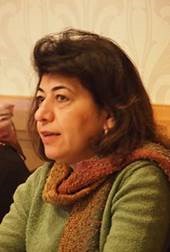Monday, August 21
“watching the fragments of our first dreams
for a lifetime.
My hand on the map
as if on an old scar.”
Every so many weeks, I look to a poem by Dunya Mikhail, a fellow citizen of Metro Detroit, and a refugee from Iraq in 1996. I’ve only known her poetry since last March when Joy Harjo introduced us. Poems like today’s locate the sensuality of lived experience in long stretches of remembered history. In “My Grandmother’s Grave,” delicate memories remembered through the poet’s senses — touch and sight and hearing — can take a reader’s imagination thousands of years into the past, only to abruptly relocate her grandmother in the ruins of wars. The poet places her grandmother amid the ruined artifacts that recall her heritage.
A challenging poem for this week when many new students arrive to risk the challenges a university places before them, many openings out into a wide world.
Have a blest week.
john st sj
Today’s Post — “My Grandmother’s Grave”
When my grandmother died
I thought, “She can’t die again.”
Everything in her life
happened once and forever:
her bed on our roof,
the battle of good and evil in her tales,
her black clothes,
her mourning for her daughter who
“was killed by headaches,”
the rosary beads and her murmur,
“Forgive us our sins,”
her empty vase from the Ottoman time,
her braid, each hair a history —
First were the Sumerians,
their dreams inscribed in clay tablets.
They drew palms, so dates ripen before their sorrows.
They drew an eye to chase evil
away from their city.
They drew circles and prayed for them:
a drop of water
a sun
a moon
a wheel spinning faster than Earth.
They begged: “Oh gods, don’t die and leave us alone.”
Over the Tower of Babel,
light is exile,
blurred,
its codes crumbs of songs
leftover for the birds.
More naked emperors
passed by the Tigris
and more ships . . .
The river full
of crowns
helmets
books
dead fish,
and on the Euphrates, corpse-lilies floating.
Every minute a new hole in the body of the ship.
The clouds descended on us
war by war,
picked up our years,
our hanging gardens,
and flew away like storks.
We said there isn’t any worse to come.
Then the barbarians came
to the mother of two springs.
They broke my grandmother’s grave: my clay tablet.
They smashed the winged bulls whose eyes
were sunflowers
widely open
watching the fragments of our first dreams
for a lifetime.
My hand on the map
as if on an old scar.
Dunya Mikhail
b. 1965, Baghdad, Iraq


Pingback: Sept 6 — attacks on DACA | Poetry Blog: "A Work Day in Hard Times"